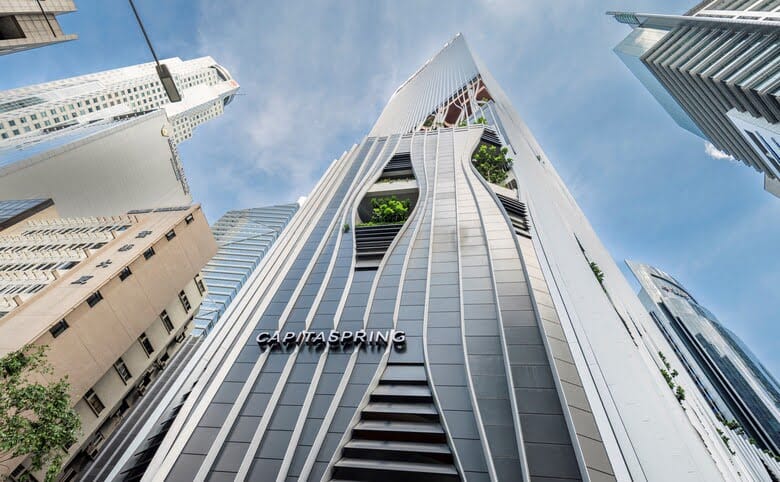
The deal values CapitaSpring’s commercial component at S$1.9 billion (Image: CICT)
CapitaLand Integrated Commercial Trust on Tuesday announced plans to acquire the 55 percent it does not already own in the commercial component of downtown Singapore’s CapitaSpring building at an agreed value of S$1.05 billion ($810 million).
SGX-listed CICT will buy the respective 45 percent and 10 percent stakes in the office and ancillary retail section of the 51-storey tower from joint venture partners CapitaLand Development and Mitsubishi Estate, the REIT’s manager said in a release. The deal values the property at S$1.9 billion, representing the midpoint between two independent assessments by Savills and Knight Frank, according to the manager.
CapitaSpring’s office space is anchored by investment bank JP Morgan, with Sumitomo Mitsui Banking Corp, JLL and White & Case also occupying the prime tower in Raffles Place. The JV partners developed the property on the former site of the Golden Shoe car park at 88 Market Street after acquiring the plot in 2017.
“CICT’s full ownership of CapitaSpring’s office tower underscores our commitment to long-term value creation,” said Teo Swee Lian, the chairman of the manager, a subsidiary of Temasek-controlled CapitaLand Investment. “Originally a multi-storey car park, CapitaSpring has been strategically redeveloped into a thriving, high value integrated development that now houses one of the most premium Grade A office properties.”
New Neighbours
The proposed transaction comes less than three months after CICT, Temasek-owned CapitaLand Development and Japanese giant Mitsubishi Estate sold the residential element of CapitaSpring to asset management titan BlackRock and Malaysia’s YTL for S$280 million. Run by CapitaLand’s Ascott division, Citadines Raffles Place occupies floors nine to 16 of the tower.

Teo Swee Lian, chairman of CICT’s manager
The commercial component of CapitaSpring spans 673,300 square feet (62,552 square metres) of net lettable area, including 661,400 square feet of offices and 11,900 square feet of retail space. The property has a committed occupancy of 99.9 percent with 30 tenants.
The total acquisition outlay is S$482.3 million, comprising the estimated purchase consideration, 55 percent share of the JV’s existing unitholders’ loans and other transaction-related expenses, according to the manager. Subject to completion adjustments, the purchase consideration takes into account 55 percent of the agreed property value and net liabilities.
The acquisition, representing an entry yield of 4 percent, does not need unitholder approval and is expected to close in the third quarter of this year. The trust will finance the buy with proceeds raised from a S$500 million private placement of new units.
Upon completion of the deal, CICT’s portfolio will climb from S$25.9 billion at present to S$27 billion, with Singapore-located investments rising from 94 percent of property value to 95 percent, according to the manager.
“We are confident in the office tower’s long-term potential to capture future growth, supported by sustained demand for quality Grade A office spaces and limited supply in the core CBD,” said Tan Choon Siang, CEO and executive director of the manager.
H1 Income Slips
CICT’s first-half net income fell 0.4 percent compared with year-earlier results to reach S$579.9 million as gross revenue dipped 0.5 percent to S$787.6 million, the manager said in a separate announcement.
The decline was mainly due to the absence of income from 21 Collyer Quay, which was sold last November for S$688 million, and Frankfurt’s Gallileo office tower, which has been undergoing upgrades since February of last year.
The lost income was partly offset by the contribution from CICT’s 50 percent stake in the ION Orchard mall, acquired last October from CapitaLand Investment for S$1.85 billion. Hong Kong’s Sun Hung Kai Properties holds the other half-stake in the property.
“Our first-half results underscore the strength and resilience of CICT, driven by active portfolio management and reconstitution efforts, as well as disciplined capital management,” Tan said.

Leave a Reply